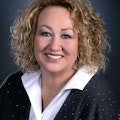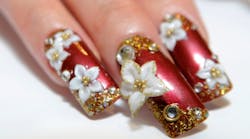Myth busters for dental assistants: Acrylic or gel fingernails at work
I can wear acrylic nails, or even gel nails. Sometimes I like to get the little jewels put on them, too. I wear gloves, so it’s perfectly fine, right?
WRONG!
Keeping natural nails trimmed and groomed is essential because (1) the majority of microorganisms on the hands are found under and around the fingernails, and (2) sharp nail edges or broken nails are likely to interfere with glove fit and glove integrity, which increases glove failure.
The debate I often hear in dental offices is that gel nails are not artificial because they aren’t “tips” and they don’t extend the nail bed. However, it’s the nail bed that has something artificial laying on it, and that is a concern. I always tell dental assistants—don’t ask social media for answers, find the correct answers from the people who make the laws.
Even though you may be using your natural nail bed for the base of the gel, the concern is that the gel can become separated from the nail bed, making it possible for bacteria to become lodged between the gel and the nail bed itself. When this happens, it’s a breeding ground for growth and infection.
The CDC says, "fingernails should be kept short and smooth. The edges should be filed smooth to allow thorough cleaning and prevent glove tears. Do not wear artificial fingernails or extenders when having direct contact with patients at high risk (e.g., those in intensive care units or operating rooms). Use of artificial nails is usually not recommended.”
Now, I realize this is the CDC talking. Many of you may be thinking, “They only make guidelines. They don’t make laws I have to follow.” You are right! However, check with your state dental board because they often pick up the guidelines the CDC distributes and write them into their practice acts, which makes them laws. Before you say, “I’ve always had long nails at every office where I’ve worked and it’s no big deal,” it’s actually a big deal for a couple of reasons.
What groups can take action
If you’ve been watching the news lately, you’ve probably noticed that there were three dental offices in Pennsylvania that were shut down by the local health department. Yes, your local health department can come into your office, just like they go into local restaurants, and shut down the office for unsafe practices. This then leads to a visit from the state dental board, which will be following up on the reason the health department visited you in the first place.
Then OSHA will have its ears open and if they receive word that things are not right in the practice the organization might step in to find out what else is going on. Keep in mind that accidents are not planned, they just happen. So, say you have some artificial nails on, they become infected, and you don’t notice right away because you have on polish. By the time you notice, it’s too late. You have a full-blown infection. How deep and how far does that infection go? Is it worth it?
When you get into the dental profession, there are certain things you need to know. It is a conservative profession. Dress appropriately, with your hair up and your nails short. Follow the rules of the CDC, the dental board, OSHA, and HIPAA. It’s that simple. If your boss allows you to get away with something it simply means your boss isn’t following the rules either. Two wrongs do not make a right. Do the right thing, follow the rules that have been set up for us, and enjoy your amazing career!
Want to read more myth busters?
I can do what I want on social media
It’s OK to carry my cell phone through the workday
Is dental assisting really a dead-end job?
About the Author

Tija Hunter, CDA, EFDA
Tija Hunter, CDA, CDIA, CDIPC, CDSH, CDSO, EFDA, MADAA, is a member and former vice president of the American Dental Assistants Association (ADAA), where she holds the honor of Master. She is the director of the Dental Careers Institute, a dental assisting and dental continuing education program, and the author of seven continuing education study courses. She is an international speaker and a certified trainer in nitrous oxide in several states. She can be reached at [email protected].
